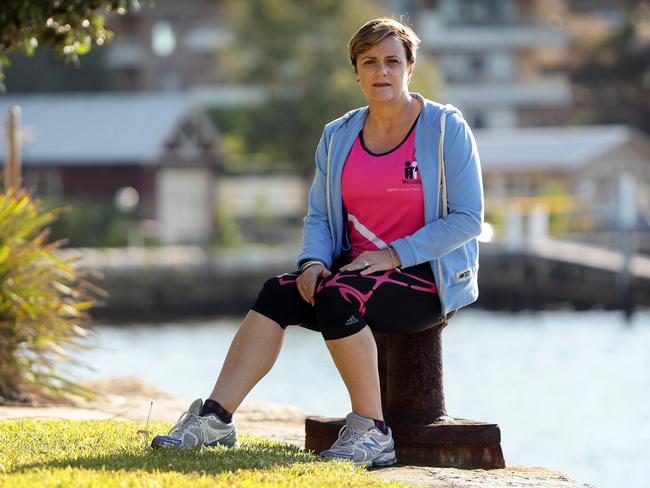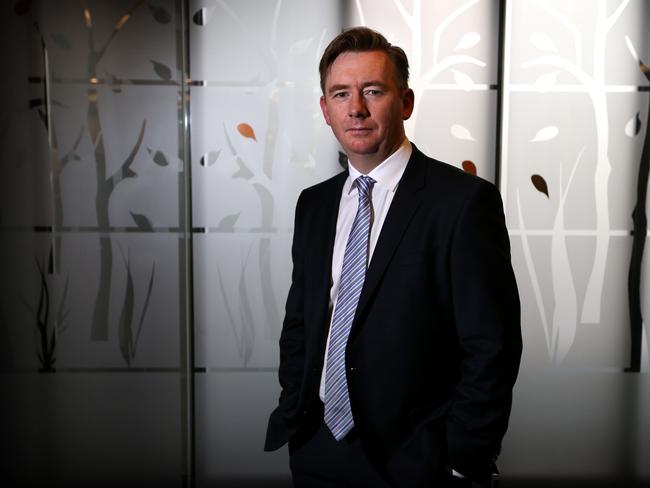Private health funds, doctors and anaesthetists milking the sick
IF you have private health insurance it is best not to get sick. The fund will leave you with an outstanding bill of up to $25,000 if you do.
Costs
Don't miss out on the headlines from Costs. Followed categories will be added to My News.
WHEN Donna Smith’s husband developed heart disease and she got cancer they lost their family home and were declared bankrupt because the health insurance they’d paid for all their lives did not cover their medical expenses.
Donna and Larry were the stars of Michael Moore’s movie Sicko, that exposed the punishing inadequacies of the US health system, but many Australian patients are beginning to share their experience.
The Americanisation of Australia’s health system has been happening by stealth.
News Corp Australia has recently exposed how breast cancer patients Tracey Ryan and Leonie Havnen were left with out of pocket medical expenses totalling over $60,000 and $30,000 not covered by either their health fund or Medicare.
A Health Consumers NSW survey uncovered a patient who had to sell their home to cover medical expenses.
A Breast Cancer Network Australia survey has found women with secondary breast cancer face out of pocket expenses of up to $25,000 for medical scans and radiotherapy not covered by Medicare or insurers.
It shows using your private health insurance is a ticket to bigger financial trouble with expenses as high as $25,000 compared to the $10,500 out-of-pockets in the public sector.
At fault are doctors and anaesthetists who charge large out-of-pocket gap fees, poor health insurance cover, Medicare rebates that haven’t kept pace with inflation and the $37.70 co-payment for medicines, which becomes crippling when a person needs more than one script per month.
Health funds provide smaller rebates when patients use providers the funds don’t own or “prefer”. They have been caught classifying gynaecology treatments as obstetrics to avoid paying rebates and signing up 80 year olds to insurance that covers them for having a baby but not a hip replacement.

Doctors are also to blame. Medibank revealed last year one of its members was left to pay $17,000 in out of pocket expenses for prostate cancer surgery when his surgeon charged $19,998. Of that the Medicare fee was $1,935 and the health fund’s gap cover was $2,938.
The fund says nine per cent of the surgeons who billed the health fund for prostate cancer procedures in 2013 charged 450 per cent more than the Medicare fee while two per cent charged 650 per cent above the schedule fee.
COMMENT BELOW: Left out of pocket despite health insurance?
Last year 6,500 Australians applied to access their superannuation to cover end of life medical expenses and in the three years to 2012 over $100 million of superannuation savings were raided to pay for health care.


Research by The George Institute for Global Health found 11 per cent or 28,665 bankruptcies in 2009 cited ill health or absence of health insurance as the primary reason.
A Menzies Centre for Health Policy study has found 250,000 Australians are spending more than 20 per cent of their income on health costs.
These American style problems are only set to escalate as Australia’s biggest health funds become for profit entities and move to adopt many of the practices of US health funds to keep shareholders happy.
Doctors and hospitals claim US-style “managed care”, where the health fund dictates your health
provider and the type of treatment you receive, is coming to Australia.
“There’s a well worn path between Australia and the US. Health fund executives from Australia go over there to see how it’s done,” Australian Medical Association president Professor Brian Owler says.
COMMENT BELOW: Should limits be placed on doctors and surgeons charges?

Medibank Private and Private Health Care Australia chief Michael Armitage told a Senate inquiry they want to go from being a payer to being a player, Prof Owler said.
“They want to dictate what doctor you see, what tests you have and insurers will manage people’s care at end cost to our system,” he warns.
Australian Private Hospitals Association chief Michael Roff says “certainly some of the funds” would like to go down the Americanisation path.
But BUPA chief Dwayne Crombie, whose business recently bought two GP clinics and which owns 200 dental practices and 30 optical stores, rejects the tag.
“It’s absolutely not managed care,’ he says.
“As an insurer I have nothing to do with how these GP clinics are run.”
He says health funds that own clinics and set up preferred provider networks are trying to get better value for their members rather than direct care.
“BUPA has 3.9 million members, it would be silly not to expect us to be a buying agent to get good value for our members,” he says.
“Most people want us to use resources in health care wisely, (but) there are so many things doctors do for which there is no evidence.”
He lists unnecessary scans and blood tests, knee arthroscopies, spinal back surgery, faulty hip replacements and aggressive treatment of tiny breast and thyroid abnormalities as examples.
Already half of all Australians with health insurance have cover that excludes treatment for certain procedures like cardiac care, hip and knee replacements or having a baby.
Health funds have restricted cover for lap band and other obesity and spinal surgery to top cover products.
And many people are signing up to what Health Minister Sussan Ley recently called “junk” health insurance — products that cover you only if you use a public hospital, something you are entitled to do for free anyway.
‘To have these subsidised by the government rebate is craziness and there are a lot of other policies that have high levels of exclusions they are only one step removed from public hospital only policies,” says Australian Private Hospitals Association chief Michael Roff, who wants them axed.

The St Vincent’s Hospital group’s CEO Toby Hall says his hospitals are turning away a handful of patients a week because their health cover won’t pay for the treatment they need and this problem has tripled in the last few years.
Adding to the pain for health fund members is an aggressive new approach to private hospital contracting.
The recently privatised Medibank is forcing private hospitals to sign controversial new contracts where it refuses to pay hospitals for a series of complications including if a mother dies in childbirth or if a patient is readmitted within 28 days of hospital discharge.
Already some hospitals with Medibank contracts are refusing to treat frail elderly patients who are readmission risks.
Australia’s second largest health fund BUPA pays hospitals a reduced rate when a patient is readmitted to a hospital within 28 days for the same condition. It won’t pay at all for a list of 8-12 “never events” that include operating on the wrong side of the body, but it does pay when a mother dies in childbirth.
A government consultation over changes to private health insurance announced last month could exacerbate these problems.
Health funds want to cut or axe altogether the default benefits they pay when they don’t have a contract with a private hospital, which could leave members using these facilities with huge out of pocket expenses.
BUPA wants to be able to contract with doctors to keep patients out of pocket expenses under control in the same way it now has preferred providers in dental and optical care.
It’s also proposing the government axe the tax rebate on health insurance cover for natural therapies and massages and spend the savings restoring the tax rebate on hospital cover which has fallen from 30 to 27 per cent.
Originally published as Private health funds, doctors and anaesthetists milking the sick



